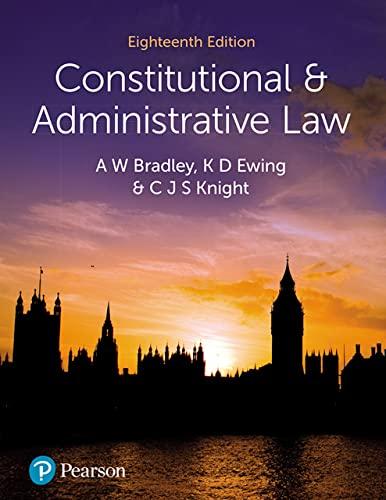Question
You are a law intern working for the PA Disciplinary Board, Office of Disciplinary Counsel. The Disciplinary Counsel-in-Charge, your boss, received numerous written complaints regarding
You are a law intern working for the PA Disciplinary Board, Office of Disciplinary Counsel. The Disciplinary Counsel-in-Charge, your boss, received numerous written complaints regarding a highly publicized personal injury attorney. She directs you to review the complaints and ascertain as to whether or not, on their face value, the complaints warrant in-depth investigation. Specifically, she wants to know what Rules of Professional Conduct, if any, the attorney may have violated, and if the attorney took proper remedial action when initially notified of the complaints. Scenario: Part III: Advertising and Soliciatation Review the following scenario and Model Rules 1.5, 1.15, 5.4 and 7.2 Background: Attorney Collins is the principal attorney and sole shareholder of a regional personal injury law firm. Attorney Collins has 4 offices and employs 3 associate attorneys and 8 paralegals. His law firm accepts only personal injury (and wrongful death) cases. Attorney Collins is a "hustler" in every sense of the word. His motto is "sign them up, and the money will follow." Attorney Collins works strictly on a contingent fee basis. His standard fee is one-third (1/3rd) of all monies recovered, plus reimbursement of all other fees and costs advanced. His fellow personal injury attorneys loathe Collins and, finally, they have had enough! Complaint: Attorney Collins' client engagement / fee letter is intentionally vague regarding fee and cost reimbursement. In cases with an expected recovery in excess of $250,000, upon request, Collins provides the client with money for food, clothing, and shelter to 'maintain' the client until such time as the case is settled. Upon resolution of the case, Collins reimburses himself for all fees and costs paid and all monies advanced directly to the client. As part of his Personal Injury practice, Attorney Collins receives interim settlement payouts from Defendant insurance companies. Collins places these funds in his firm's general operating account and uses these funds to pay fees and costs as the case progresses. At the conclusion of the case a full accounting occurs. All monies recovered are assigned and paid to Collins or the client in accord with the client engagement / fee letter. In addition to traditional forms of advertising, Attorney Collins pays traffic court clerks $100 for each new client referred. Attorney Collins also maintains a network of local attorneys who refer him cases in return for 25% percent of the contingent fee collected. All that is required to obtain the referral fee is to convince the client to 'sign up' with Collins. The referring attorney has no further involvement in the case.
Instructions: Based on the scenario presented above, answer the following questions: 1) Does Attorney Collins' client engagement / fee letter violate ethical rules? If so, what rules did Collins violate and how? Be specific. 2) Does Attorney Collins' habit of 'fronting' living expenses to certain clients violate ethical rules? If so, what rules did Collins violate and how? Be specific. 3) Does Attorney Collins' deposit, use, and subsequent accounting / distribution of insurance payouts received during the case violate ethical rules? If so, what rules did Collins violate and how? Be specific. 4) Does Attorney Collins' payment to traffic court clerks or referring attorneys violate ethical rules? If so, what rules did Collins violate and how? Be specific.
Step by Step Solution
There are 3 Steps involved in it
Step: 1

Get Instant Access to Expert-Tailored Solutions
See step-by-step solutions with expert insights and AI powered tools for academic success
Step: 2

Step: 3

Ace Your Homework with AI
Get the answers you need in no time with our AI-driven, step-by-step assistance
Get Started


